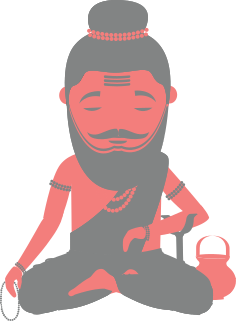Pradyumn is a significant figure in Hindu mythology, particularly within the Vaishnavism tradition. He is the son of Lord Krushna and Rukmini, making him an important member of the Yadava dynasty. The story of Pradyumn is associated with his birth, his separation from his parents, and his eventual reunion with them.

Pradyumn was born to Lord Krushna and Rukmini. However, shortly after his birth, he was abducted by the demon Sambara. Sambara threw Pradyumn into the sea, where he was swallowed by a fish. The fish was caught by a fisherman, and when he cut it open, he discovered the child. Pradyumn was then raised by the fisherman and his wife. As Pradyumn grew up, he became a valiant and heroic young man. Pradyumn eventually learned about his true identity and the circumstances of his birth. He confronted Sambara, defeated him, and reunited with his parents, Krushna and Rukmini.
While Pradyumn’s direct involvement in the Mahabharat epic is not extensively detailed, some versions of the Purans and related texts provide insights into his heroic deeds and contributions during the events of the Mahabharat.
Pradyumn played a role in the Mahabharat, particularly in the Yadava clan’s involvement in the great war. He married Mayavati, an incarnation of Rati (the consort of the god of love, Kamadev), and together they had Aniruddh, who became an important figure in the Yadava lineage.
Pradyumn and Mayavati’s son, Aniruddh, plays a notable role in the Mahabharat. Aniruddh falls in love with Usha, the daughter of Banasur, an ally of the demon king Shishupal. Their love story and subsequent marriage lead to a conflict between Aniruddh and Banasur. While Pradyumn’s direct participation in the Battle of Kurukshetra is not explicitly mentioned in the Mahabharat, some Puranic traditions suggest that he played a supportive role in the Yadava army. The Yadavas, including Pradyumn and his son Aniruddh, were allies of the Pandavs.
Pradyumn is associated with the events leading to the destruction of Dwarka. The Yadavas faced a curse due to a disagreement among themselves, which resulted in a series of destructive events. The city of Dwarka submerged into the sea. Pradyumn’s role during these tumultuous events symbolizes the cyclical nature of divine occurrences and the inevitability of cosmic order.
While the Mahabharat primarily focuses on the story of the Pandavs and Kauravs, the events involving the Yadava clan, including Pradyumn, are often found in the Puranic narratives and related texts. Pradyumn’s character represents the heroic and divine lineage of Lord Krushna, contributing to the broader tapestry of the Mahabharat and its associated traditions.
